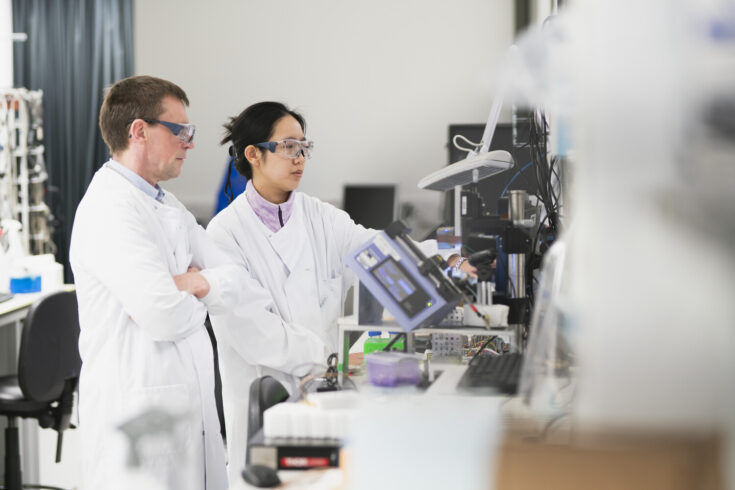The Early-Stage Prosperity Partnerships have received almost £5 million from the Engineering and Physical Sciences Research Council (EPSRC), matched with funding from the business partners, to deliver:
- new ways of producing specialist alloys by innovations to the continuous casting method of alloy creation
- innovative polymer products which are both biodegradable and recyclable, and have the same functionality as conventional plastics
- improvements in the production of titanium sheet metal used in the aerospace industry
- better design and development of artificial intelligence (AI) alloys used in sustainable manufacturing
- the design and development of high-performance precious metal alloys customised for an advanced manufacturing process called laser powder bed fusion
- sustainable, 100% biomass-derived flexible packaging that will be compatible with commercial high-speed production packaging lines
- more affordable electric vehicles by eliminating magnets from electric drives (eDrives)
- new applications for a recently discovered low avalanche noise semiconductor, AlGaAsSb
- a robust, carbon-neutral and cost effective process to treat sludge (from human waste) and to recover valuable materials and clean water from it
These new partnerships showcase the breadth of research and innovation in the UK and will boost economic growth regionally and nationally. Nine of the 14 businesses involved were small and medium-sized enterprises, which further demonstrates the huge added value that businesses can expect to gain by partnering with some of the UK’s best researchers.
Exploring important topics
Dr Andrew Bourne, Executive Director of Partnerships at EPSRC said:
I am excited to announce the EPSRC support of a number of ambitious early-stage academic-business research collaborations which complement the established EPSRC Prosperity Partnerships initiative.
These partnerships which particularly encourage small and medium-sized enterprises will further promote business investment in discovery science and explore important topics including green packaging and sustainable manufacturing.
The business-academia partnerships are:
- University of Dundee and Rautomead Ltd
- University of Birmingham and Aquapak Polymers
- University of Strathclyde and ITP Aero
- Brunel University London and Alloyed
- University of Birmingham and Cooksongold
- Imperial College London and Unilever Global
- The University of Sheffield and Phlux Technology
- Newcastle University and GKN Automotive
- Newcastle University and Mitchell Dryers
Further information
Advanced alloy development by high performance processing
Dr Thomas Jones, University of Dundee and Brian John Frame, Rautomead Ltd
This project will improve the design of continuous casting rigs, that produce high-value, high-quality alloys, by identifying the correct heat transport properties and material compatibility of a rig design.
The partnership shall also lead to the development of an advanced computational model in rig design. The project will contribute to the economic development of the Dundee area and pin Dundee as a centre for alloy processing innovation.
Co-creating a digital platform for the rapid development of sustainable polymer products
Dr Christopher Windows-Yule, University of Birmingham and Dr John R Williams, Aquapak Polymers
Plastic waste is one of the great, global challenges facing society today. This project will deliver the manufacture of novel polymer products which are both biodegradable and recyclable, yet maintain, or even exceed, the functionality of conventional plastics.
Towards sustainable superplastic forming: an ITP Aero/Strathclyde Prosperity Partnership
Professor Bradley Wynne, University of Strathclyde and Mark Dodds, ITP Aero
This project will minimise energy use and material waste and enhance productivity throughout the lifecycle of the aerospace titanium superplastic forming process.
Superplastic forming is an advanced sheet metal forming process for producing large, complex, thin-walled, near net shaped components which are difficult to make via traditional forming processes from hard-to-form materials such as titanium alloys.
Aluminium alloy design strategy for sustainable manufacturing
Professor Hari Babu Nadendla, Brunel University London and Sajjad Amirkhanlou, Alloyed
The goal of this project is to help accelerate the process of design and development of Al alloys for sustainable manufacturing. Currently, the approach to developing new alloys involves selecting a standardised alloy and then modifying its composition through trial and error based on research insights and experience.
This partnership will develop physical and empirical models to analyse and rank thousands of potential alloy compositions simultaneously across a range of performance metrics.
Additive manufacturing of precious metals with improved resilience and multifunctionality
Dr Biao Cai, University of Birmingham and Dr Selassie Dorvlo, Cooksongold
Precious metals are an indispensable material for many production processes and products in today’s world, from wedding rings to dental implants.
This project aims to design, develop, fabricate, and test high performance precious metal alloys specifically customised for laser powder bed fusion, a 3D printing technique, targeting applications in space, healthcare, glass manufacturing and jewellery.
Transforming flexibles for a green packaging future
Professor Koon-Yang Lee, Imperial College London and Mark Newman, Unilever Global
Achieving a sustainable and net zero ambition for fast-moving consumer goods (FMCG) packaging is a significant industrywide challenge.
This project aims to create truly sustainable flexible packaging that will be both net zero and circular, while also being compatible with commercial high-speed product packaging lines.
Sheffield-Phlux Advance Research Collaboration (SPARC)
Professor Jo Shien Ng, The University of Sheffield and Benjamin White, Phlux Technology
This project will accelerate a recently discovered low avalanche noise semiconductor, AlGaAsSb, to become the preferred solution for a variety of important low photon sensing applications.
Zero-magnets electric drive for electric vehicles (Z-M drive)
Professor Volker Pickert, Newcastle University and Mike Soumelidis, GKN Automotive
This partnership aims to radically change eDrives for electric vehicles (EVs) by eliminating magnets. While magnets have been the go-to solution for most EVs, they are not environmentally sustainable.
The ultimate goal is to develop zero-magnet electric drives that can create a more resilient and affordable EV industry accessible to everyone.
Sustainable sludge valorisation technology for closed-loop resource recovery
Professor Anh Phan, Newcastle University and Graham Hartley, Mitchell Dryers
The partnership will develop a robust, carbon-neutral and cost effective process to treat sludge (from human waste) and to recover valuable materials and clean water from it.
The innovative technology developed can also help reduce logistical costs of sludge from septic tanks and other rural areas where wastewater collection infrastructure is not well established.

